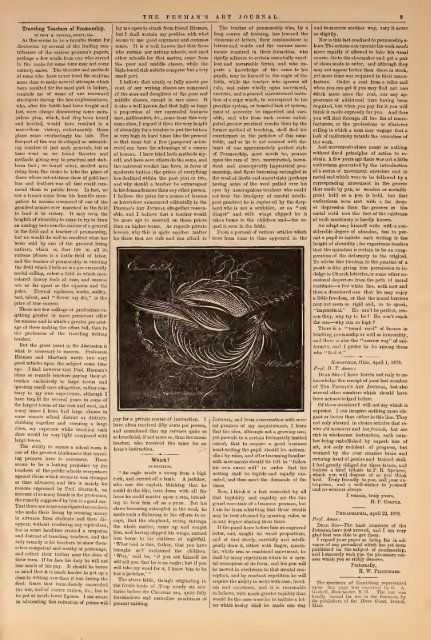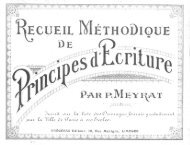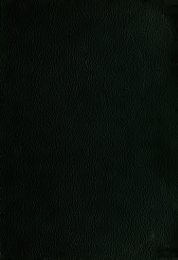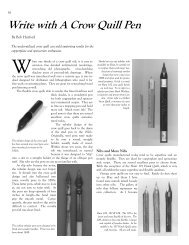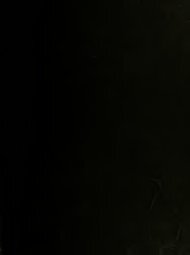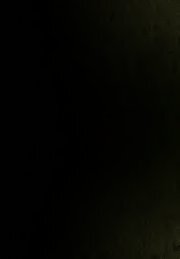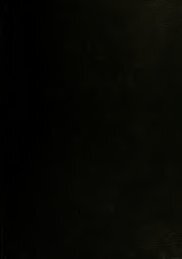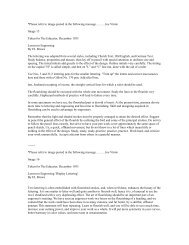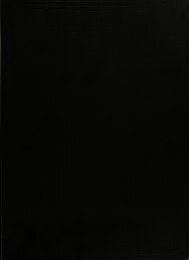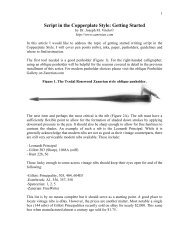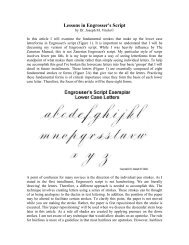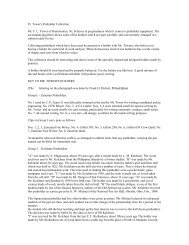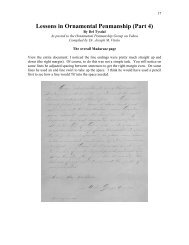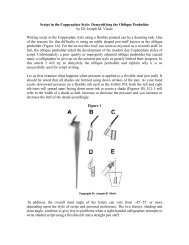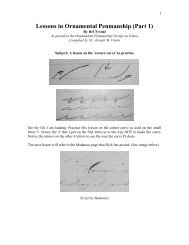Penman's Art Journal (Volume 2) - Iampeth
Penman's Art Journal (Volume 2) - Iampeth
Penman's Art Journal (Volume 2) - Iampeth
You also want an ePaper? Increase the reach of your titles
YUMPU automatically turns print PDFs into web optimized ePapers that Google loves.
Traveling Teachers of Pemnaiuhip.<br />
As tbi8 seems to be a favorite theme for<br />
dtscaseion by several of the leadiug con-<br />
tributors of the various penmau's papers,<br />
perhaps a few words from one who served<br />
in the ranks for some time may not come<br />
entirely amies. The theories and methods<br />
of some who have never tried the realities<br />
more than to make aeveral attempta which<br />
have resulted for the most part in failure,<br />
remiude me of some of our renowned<br />
slratepists dnring the late nu pleasantness,<br />
who, after the battle had been fought aud<br />
lost, were always discovering some miraculous<br />
pliin, which, had they been heard<br />
and heeded, would have resulted in a<br />
marvellous victory, nufortunately tliese<br />
plana came everlastingly too late. The<br />
forepart of the war developed an astouisli-<br />
iiig number of just such generals, but as<br />
time went on we found theories and<br />
methods giving way to practical and stubborn<br />
fact ; we found sober, modest men<br />
rising from the ranks to take the place of<br />
those whose ostentatious show of gold-lace<br />
fuse and feathers waa all that could commend<br />
them to public favor. In fact, we<br />
saw a tanner come from his humble occu-<br />
pation to assume command of one of the<br />
grandest armies ever marched in the field<br />
to lead it to victory. It may seem the<br />
hdiighth of absurdity to some to try to draw<br />
an analogy beti\ een the success of a general<br />
in the field and a teacher of penmanship,<br />
but we would do well to recollect what lias<br />
been said by onH of the greatest liviug<br />
authors, which is, that life in all its<br />
various phases is a battle-field of labor,<br />
and the teacher of penmanship in entering<br />
the field, which I helifve is a pre-eminently<br />
useful calling, enters a field in which rose-<br />
colored downy beds of ease, and succes.s<br />
are as far apart a« the equator and the<br />
poles. Eternal vigilance, works, ability,<br />
tact, talent, aud "Never say die," is the<br />
price of true success.<br />
There are few callings or professions requiring<br />
gi-eater or more persistent effort<br />
for success and in which a greater per centage<br />
of these making the effort fail, than in<br />
the profession of the traveling writing<br />
teacher.<br />
But the great point in the d<br />
what is necessary to success.<br />
Hinman and Shattuck wrote two very<br />
good articles upon the subject some time<br />
ago. I find however that Prof. Hinman's<br />
ideas as regards teachers paying their attention<br />
exclusively to large towns and<br />
ignoring small ones altogether, rather con-<br />
trary to my own experience, although I<br />
have taufht for aeveral years in some of<br />
the largest towns of the east aud west, and<br />
many times I have had large classes in<br />
some remote scliool district or districts,<br />
clubbing together and securing a large<br />
class, my expenses while teaching such<br />
class would be very light compared with<br />
large towns.<br />
The ability to secure a school room is<br />
one of the greatest hindrances that traveling<br />
penmen have to encounter. There<br />
seems to be a lurking prejudice by the<br />
teachers of the pubUc schools everywhere<br />
agamst them which seems to wax stronger<br />
as time advances, and this is mainly for<br />
reasons expressed by Prof. Shattuck, on<br />
account of so many frauds in the profession,<br />
the remedy suggested by him is a good one.<br />
That there (ire some unmitigated scoundrels<br />
who make their living by securing money<br />
in advance from students and then dis-<br />
appear, without rendering any equivalent,<br />
has in some localities created a suspicion<br />
and distrust of traveling teachers, and the<br />
only remedy is for teachers to show them-<br />
selves competent and worthy of patronage,<br />
and collect their tuition near the close of<br />
their term. If he does his duty he will not<br />
lose mnoh of his pay. It should be borne<br />
in mind that it is much harder to get up a<br />
class in writing now than it was during the<br />
flush times that immediately succeeded<br />
the war, and of course ttiiUon, ic, has to<br />
be put at much lower figures. I am aware<br />
in advocating this reduction of prices will<br />
THE PENMAN'S ART JOURNAL.<br />
lay me open to attack from friend Hinman,<br />
but I shall sustain my position with what<br />
seems to me good argument and common<br />
sense. It is a well known fact that those<br />
who sustain our writing scbool«, and most<br />
other schools for that matter, come from<br />
the poor and middle classes, while the<br />
high-toned rich nabobs comprise but a very<br />
small part.<br />
I believe that nearly or fully ninety per<br />
cent, of our writing classes are composed<br />
of the sons and daughters of the poor and<br />
middle classes, except in rare cases. It<br />
is also a well known fact that fully as large<br />
a proportion of our successful business<br />
men, millionaires, &c., come from this very<br />
same class, I regard it then the very height<br />
of absurdity for a teacher to put the tuition<br />
BO very high in hard times like the present<br />
so that none but a few {pampered aristo-<br />
crats) can have the advantage of a course<br />
of lessons. I have tried both methods myself,<br />
and have seen others do the same, and<br />
the universal verdict has been in favor of<br />
moderate tuition ; the prices of everything<br />
has declined within the post year or two,<br />
and why should a teacher be extravagant<br />
in hia demands more than any other person.<br />
I believe the price for a course of lessons<br />
as heretofore announced editorially in the<br />
<strong>Penman's</strong> Akt JotniNAL altogether reasonable,<br />
and I believe that a teacher would<br />
be more apt to succeed on those prices<br />
than on higher terms. As regards private<br />
lessons, why this is quite another matter<br />
for those that are rich and can afford to<br />
pay for a private courae of instruction. 1<br />
have often received fifty cents per person,<br />
and considered that my services quite as<br />
as beneficial, if not more so, than the music<br />
teacher, who received the same for an<br />
hour's instruction.<br />
Which 1<br />
" An eagle made a swoop from a high<br />
rock, and carried off a lamb. A jackdaw,<br />
who saw the exploit, thinking that he<br />
could do the like, bore down with all the<br />
force he could muster upon a ram, intend-<br />
ing to bear him off as a prize. But his<br />
claws becoming entangled in the wool, he<br />
made such a flntteriug in his efforts to escape,<br />
that the shepherd, seeing tbrougu<br />
the whole matter, came up and caught<br />
him, and having clipped his wings, carried<br />
him home to his children at nightfall.<br />
' What bird is this, father, that you have<br />
brought us?' exclaimed the children.<br />
'Why,' said he, * if you ask himself he<br />
will tell you that he is an eagle ; but if you<br />
will take my word for it, I know him to be<br />
but a jackdaw,' "<br />
The above fable, though originating in<br />
the fertile brain of .Esop nearly six cen-<br />
turies before the ChrLstian era, quite fully<br />
foreshadows and embodies conditions at<br />
present existing.<br />
The teacher of penmanship who, by a<br />
long course of training, has learned the<br />
elements of letters, their combinations in<br />
letters and words and the various movements<br />
required in their formation, who<br />
rigidly adheres to certain essentially excel-<br />
lent and uuvariable forms, aud who im-<br />
parts a knowledge of the same to his<br />
pupils, may be likened to the eagle of the<br />
faille, while the teacher who ignores all<br />
rule, and relies wholly upon movement,<br />
exercise, and a general unrestrained imita-<br />
tion of a copy which, to correspond to his<br />
peculiar system, or boasted lack of system,<br />
must of necessity be imperfect and vari-<br />
able, and who from such course antici-<br />
pated greiiter practical results than by the<br />
former method of teaching, shall find his<br />
counterpart in the jackdaw of this same<br />
fable; aud as he is not content with the<br />
lamb of one approximately perfect style<br />
of Penmanship, must needs be, pounce<br />
upon the ram of free, unrestricted, incon-<br />
stant and consequently impractical penmanship,<br />
and there becoming entangled in<br />
the wool of doubt and uncertainty (perhaps<br />
having some of the wool pulled over his<br />
eyes by uuscrupulous teachers who could<br />
not bear the drudgery of careful intelli-<br />
gent practice) he is captured by the shepherd<br />
who is not a scribbler, or an "ink<br />
slinger" and with wings clipped he is<br />
taken home to the children and—the se-<br />
quel is seen in the fable.<br />
From a perusal of various articles which<br />
have from time to time appeared in the<br />
JoniiNAL, and from conversation with seve-<br />
ral penmen of my acquaiutance, I learn<br />
that the idea, although not a growing one,<br />
yet prevails to a certain fortunately limited<br />
extent, that to acquire a good business<br />
hand-writing the pupil should be unlram-<br />
elled by rules, and after becoming familiar<br />
with movements should be left to " follow<br />
hia own sweet will" in order that his<br />
wi'ttiug shall be legible and rapidly exe-<br />
cuted, aud thus meet the demauds of the<br />
Now, I think it a fact conceded by all<br />
that legibility and rapidity are the two<br />
grand essentials of u business penman, but<br />
I am far from admitting that these results<br />
may be best attained by ignoring rules, or<br />
in any degree abating their force.<br />
If the pupil have before him an engraved<br />
letter, and. taught its exact proportions,<br />
and at first slowly, carefully and intelligently<br />
draw it, either with finger, muscular,<br />
whole arm or combined movement, he<br />
shall by many repetitions attain to a men-<br />
tal conception of its form, and his pen will<br />
be moved in obedience to that mental con-<br />
ception, aud by constant repetition he will<br />
acquire the ability to write with ease, freedom<br />
and exactness, and it is reasonable<br />
to believe, with much greater rapidity than<br />
would be the case were he to imitate a letter<br />
which to-day shall be made one way<br />
and to-morrow another way, vary it never<br />
BO slightly.<br />
Nor is this fact confined to penmanship alone.<br />
The artisan can execute his work much<br />
more rapidly if allowed to take his usual<br />
course. Go to the shoemaker and get a pair<br />
of shoes made to order, and although they<br />
may not appear better than those in stock,<br />
yet more time was required in their manufacture.<br />
Order a coat from a tailor and<br />
when you can get it you may fiud not one<br />
stitch more upon the coat, nor any appearance<br />
of additional time having been<br />
required, but when you pay for it you will<br />
think it made expressly for you. And thus<br />
you will find through all the list of manufacturers,<br />
or the professions or whatever<br />
calling in which a man may engage that a<br />
lack of uniformity retards the execution of<br />
tlie work.<br />
Aud movement.i alone count as nothing<br />
without fixed principles of action to re-<br />
strain. A few years ago there waa not a little<br />
enthusiasm generated by the introduction<br />
of a series of movement exercises cast in<br />
metal and which were to be followed by a<br />
correspondiug movement in the groove<br />
thus made by pen, or wooden or metallic<br />
point held as a pen is held, but that<br />
enthusiasm soon met with a far deep-<br />
er depression than the grooves in the<br />
metal uutil now the fact of the existence<br />
of such machinery is hardly known.<br />
An adept may himself write with a con-<br />
siderable degree of abandon, but to permit<br />
a pupil to imitate such writing is the<br />
height of absurdity ; for experience teaches<br />
that the imitation is certain to be an exag-<br />
geration of the deformity in the original.<br />
To advise this freedom in the practice of a<br />
youth is like giving him permisaiou to indulge<br />
in Church lotteries, or gome other occasional<br />
departure from the path of moral<br />
rectitude—a few white lies, with now and<br />
then a discolored one that he may enjoy<br />
a little freedom, or that the moral barriers<br />
may not seem so rigid and, so to speak,<br />
"impractical." Ho can't be perfect, reason<br />
they, why try to be ? He can't reach<br />
the sun—why aim so high ?<br />
There is a " broad rood" of license in<br />
teoching i-enmanshp as well as in morality,<br />
aud there is also the "narrow way" of uni-<br />
formity, aud I prefer to be among those<br />
who " fiud it ."<br />
KiNGSViLLE, Ohio, April 1, 1878.<br />
Pro/. D. T. Ames:<br />
Dhae Sir—I have herein not only to acknowledge<br />
the receipt of your last number<br />
of The <strong>Penman's</strong> <strong>Art</strong> Jodrnal, but also<br />
several other numbers which should have<br />
been acknowledged before.<br />
Of these numbers I will not say which ia<br />
superior. 1 can imagine nothing more elegant<br />
or better than either in this line. They<br />
not only abound in choice articles that re-<br />
vive old memwies and lost/riends, but are<br />
rich in wholesome instruction, each num-<br />
ber being embellished by superb bits of<br />
art, not only redolent of progress, but<br />
warmed by the ever creative brain and<br />
cunning hand of genius and trained skill.<br />
I feel greatly obliged for these favors, and<br />
inclose a brief tribute to P. R. Speneer,<br />
which you will dispose of as you think<br />
best. Truly friendly to you, and >our enterprises,<br />
and a well-wisher to yourself<br />
and co-workers always.<br />
I remain, truly yours,<br />
H. P. Cooper.<br />
PhUjADelphia, April 22, 1878.<br />
Prof. Ames :<br />
Deak Sir—The back numbers of the<br />
<strong>Journal</strong> have just arrived, audi am very<br />
glad that waa able to get them.<br />
I regard your paper as being far in advance<br />
of any periodical which has yet been<br />
published on the subject of penmanship,<br />
and I sincerely wish you the pecuniary success<br />
which you so richly deserve.<br />
Fraternally,<br />
H. W. FUOKINOER.<br />
the publishers of the JIotiu OueU, Boston,


